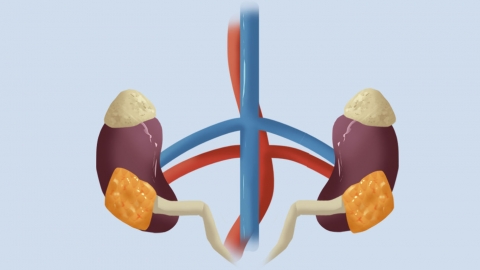Why do patients with kidney failure experience confusion or altered consciousness?
Generally, renal failure patients experiencing confusion may be caused by accumulation of metabolic waste, insufficient cerebral blood flow perfusion, electrolyte imbalance, uremic encephalopathy, hypertensive encephalopathy, and other related factors. If the symptoms of confusion are significant or continuously worsen, prompt medical attention at a reputable hospital is recommended. Detailed explanations are as follows:
1. Accumulation of Metabolic Waste
Renal failure leads to decreased kidney excretion function, causing metabolic waste such as urea and creatinine to accumulate in the body, affecting central nervous system function and causing confusion. It is important to promptly remove metabolic waste through hemodialysis or peritoneal dialysis, while controlling protein intake to reduce waste production.
2. Insufficient Cerebral Blood Flow Perfusion
Patients with renal failure often experience anemia and fluctuating blood pressure, which can lead to insufficient cerebral blood flow perfusion, cerebral ischemia and hypoxia, resulting in confusion. Blood pressure should be monitored regularly in daily life to avoid hypotension. Anemic patients can take iron supplements under medical guidance, such as ferrous fumarate tablets, ferrous succinate tablets, and iron dextran oral solution, to improve cerebral blood supply.

3. Electrolyte Imbalance
Renal failure can easily lead to electrolyte imbalances such as hyperkalemia and hyponatremia, which affect nerve conduction function and cause confusion. Regular monitoring of electrolyte levels is necessary. Patients with hyperkalemia can take medications such as calcium polystyrene sulfonate powder, furosemide injection, and calcium gluconate injection under medical guidance to correct the imbalance. Patients with hyponatremia need appropriate sodium supplementation.
4. Uremic Encephalopathy
This is a complication occurring in the advanced stages of renal failure. Large accumulations of metabolic waste directly damage brain cells, leading to neurological dysfunction, confusion, and even coma. Enhanced dialysis therapy is needed, increasing both frequency and duration of dialysis. Additionally, medications such as sodium citicoline injection, oxiracetam injection, and piracetam injection may be used under medical guidance to protect brain cells.
5. Hypertensive Encephalopathy
Patients with renal failure often have hypertension. A sudden rise in blood pressure can cause cerebral vascular spasm and cerebral edema, leading to confusion. Blood pressure should be strictly controlled under medical guidance using medications such as nifedipine controlled-release tablets, valsartan capsules, and benazepril hydrochloride tablets, avoiding drastic fluctuations in blood pressure.
In daily life, maintaining a regular routine and avoiding fatigue are important. Strict adherence to a low-salt, low-protein diet is essential. Emotional stability should be maintained to avoid mental stress. Regular follow-up tests of kidney function and electrolyte levels are necessary, adjusting treatment plans according to disease progression to maintain bodily function stability.








